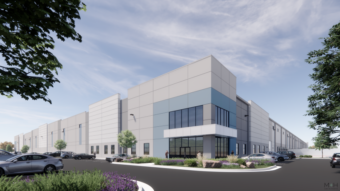James McHugh Construction Co. has completed the ground-up construction of two apartment developments in Chicago: the 11-story Westerly by Fifield Cos. in the River West neighborhood, and NEMA Chicago by Crescent Heights in the South Loop. At 76 stories, NEMA Chicago is the tallest all-residential building in Chicago and fifth tallest in North America.
“These two projects are indicative of the range of multifamily work McHugh excels at—whether it’s a mid-rise for a repeat client or a supertall, a product we know how to build like the back of our hand,” said Michael Meagher, president of McHugh Construction. “While the pandemic added another layer of complexity, our quick pivot to adopting new social distancing protocols allowed us to stay on time and on budget for both of these high-end buildings.”
Located at 740 N. Aberdeen Street, Westerly is a mixed-used development by Chicago-based Fifield Cos. offering 188 apartments and 2,400 square feet of ground-floor retail space. Designed by FitzGerald Associates Architects, the mid-rise building features a brick and glass façade and includes a mix of studio, one-, two- and three-bedroom units, ranging in size from 544 to 1,513 square feet, with interiors by Morgante Wilson Architects. McHugh broke ground on the project in July 2019 and completed the building in October 2020. Substantial completion was received on the project three weeks ahead of schedule despite the challenges of 2020.
“Westerly marks the eighth project we have completed for Fifield Cos. in the last 12 years,” said Ray Cisco, project executive with McHugh Construction. “It’s always exciting to expand on our excellent relationship with Fifield, and to work again with FitzGerald, the project architect. Our previous history with these firms facilitates a seamless experience, especially when something unexpected like a pandemic comes up.”
With Westerly’s location along the city’s Hipster Highway bikeway, McHugh constructed ample bike storage and a bike “kitchen” for maintenance and repairs, in addition to a parking garage with 80 spaces. Building amenities include a fitness center, resident lounge, penthouse-level party room, coffee bar, conference center and dedicated coworking space. Outdoor amenities include a landscaped sun terrace on Westerly’s third level, featuring a pool, shade cabanas, grilling stations and private seating and dining areas.
McHugh Construction also recently completed the final phase of the 896-foot NEMA Chicago, the city’s tallest apartment tower. McHugh broke ground in 2016 for the 76-story building and topped off the concrete-framed structure in 2018. Residents began moving into the building in May 2019, while McHugh continued interior build-out of floors 48 through 76. Final completion, including the Skyline Collection residences and the Signature Amenity spaces at Level 48, was achieved in September 2020.
“Thoughtful design and impeccable finishes—from coffered ceilings to ornamental metalwork—were carried throughout the development, requiring us to carefully select a team that could work with the custom materials while hitting timing goals,” said Dave Steffenhagen, McHugh Construction senior project manager on the NEMA Chicago project. “Through constant collaboration with the owner, architect and subcontractors, the project met the intent of the designers and was delivered on budget and ahead of schedule.”
Developed by Miami-based Crescent Heights and designed by world-renowned architect Rafael Viñoly, the 76-story NEMA Chicago is located at 1210 S. Indiana Avenue and offers 800 apartments. The building’s 70,000 square feet of amenity space includes several indoor and outdoor lounges and terraces; two swimming pools; sauna and steam rooms; a glass-enclosed event space with an immersive sound system and catering kitchen; and a private bar lounge with 22-foot ceiling heights and floor-to-ceiling windows. The fitness center includes strength and cardio areas as well as a boxing ring, yoga studio, basketball and squash courts and a golf simulator.
NEMA Chicago also gave McHugh the opportunity to complete one of the few “real time” design spaces it’s seen in the multifamily sector. A large section of the building’s 48th floor was intentionally left as a “white box” amenity space until most of the building was complete and residents had already begun to move in. While the space was tentatively earmarked for a yoga studio, the pandemic and popularity of the building’s coworking spaces prompted Crescent Heights to change the design for the space into office/business suites. This meant McHugh had a condensed schedule to order materials and complete construction within the set timeframe.
“Tastes, trends and tenant preferences can change drastically between groundbreaking and first move-ins,” Steffenhagen said. “By leaving this space purposely vacant until the last possible moment in the construction schedule, we were able to work closely with the developer and architects to change course and create additional coworking space for residents.”





